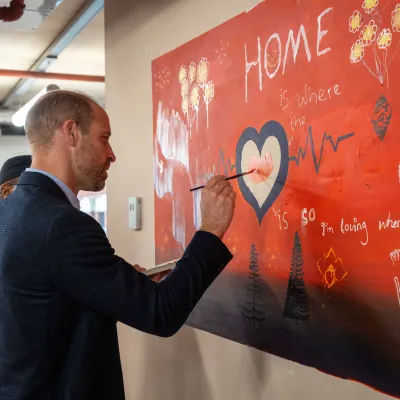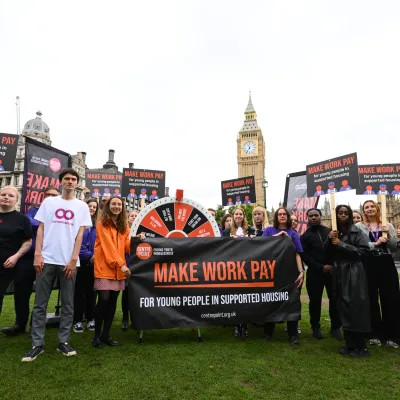In our Comprehensive Spending Review submission, we make the case for greater investment in homelessness services and reforms to the social security system for young people experiencing homelessness.
The Covid-19 pandemic is an economic crisis as well as a health crisis. The locking down of businesses and industries has hit young people especially hard, with many young workers in sectors such as food, retail and leisure losing employment and opportunities.
At Centrepoint, we’ve seen how the pandemic has already had a massive impact on young people experiencing homelessness as social distancing measures made sofa-surfing almost impossible, and how the closure of face-to-face public and voluntary services have impacted young people facing housing crisis.
And with the situation looking to get worse before it gets better, we think now is the right time to put measures in place to support vulnerable young people across the country.
Four policy and investment decisions
That’s why we’ve called for some critical policy and investment decisions, which although not costing huge amounts in the context of overall government spending, we think will make a major difference to young people going through homelessness.
1) Long term investment into homelessness services and support
With more people facing financial insecurity due to the impacts of Covid-19, it is critical that councils are equipped to provide housing support for those in need. Our research found that three-quarters of English councils thought that homelessness in their area was likely to increase due to the pandemic, and fewer than four in ten said that financial measures went far enough to help them run effective services.
A decade of cuts and underinvestment into local authority budgets mean that councils, charities and housing providers are already struggling to support those facing homelessness. Without the financial backing needed to run homelessness services properly, there is a real risk that thousands of people will fall through the gaps.
By investing a billion pounds a year into homelessness services, and ring fencing this money to ensure it is spent in this area, the government can empower local government and communities with the long term resources they need to tackle homelessness locally.
2) Ensuring young people can access adequate financial support for housing costs
For young people seeking accommodation in the private rented sector, low benefit rates can make it almost impossible to find a place to rent for those on low incomes.
In response to the pandemic, the Government increased Local Housing Allowance rates to cover the bottom thirty per cent of rents in local areas. These rates had been frozen for years, driving the gap between what people could claim and actual rents wider and wider, and making it ever more difficult to find affordable housing to rent.
By bringing rates back to the thirtieth percentile, the government has increased accommodation options for people on low incomes, and while there are still significant difficulties the new rates are already improving access to housing. That’s why we’re calling on the government at the very least to ensure that rates remain linked to the thirtieth percentile, and to make sure that they increase in line with real rents across the country.
Young people are only entitled to the lowest rate of housing benefit and housing support through Universal Credit, which is limited to the amount deemed enough to rent a room in a shared house.
This presents young people with several challenges. Firstly, options for shared housing are limited across many parts of the country, with our research finding only one in ten landlords letting shared accommodation in 2018. Secondly, for many vulnerable young people, such as care leavers and those moving on from homelessness, shared housing is often not an appropriate and secure option.
And finally, the rates that young people are entitled to simply don’t match the real costs of renting across large parts of the UK.
Centrepoint made these points in our first Chance to Move On campaign, and the government agreed to exempt care leavers and young people moving on from homelessness from this shared rate and increase the amount they would be entitled to claim. However, they are not bringing this exemption in until 2023.
But with a looming homelessness crisis, and a rise in the number of people needing to access hostels and other supported accommodation, it’s critical that these exemptions are brought forward. Without this, there is the risk that young people will continue to struggle to move on from homelessness and services won’t be able to support those in crisis.
3) Fixing the benefits system for young people in supported housing
Another issue we raised in our submission is how problems in the benefits system can leave young people struggling to access employment opportunities and take on paid work.
For young people experiencing homelessness, access to stable work can be critical to build the income, savings, confidence and skills to move into their own accommodation and on with their lives. However, for those in supported housing, complicated benefits rules can mean working over a low number of hours can actually see them end up with less money in their pocket, and only minimally better off than if they were not working at all.
This problem sees Centrepoint residents too often feeling they have to turn down employment and development opportunities, and in some cases going into rent arrears and debt.
That’s why we’ve called on the Government to make some small tweaks to the benefits system, to help reduce barriers to employment and ensure that work does always pay for young people in supported housing.
4) Ensuring that young people on universal credit have enough to live on
A major problem with the benefits system for homeless young people is that rates are just too low. Under 25s receive a lower rate of Universal Credit, based on the idea that they are more likely to have financial support from family, but for many young people going through homelessness this just isn’t this case. For these young people, lower benefit rates mean constant financial hardship and insecurity.
Due to Covid-19, the Government increased benefit rates by £20 a week, for both under and over 25s. This has provided vital breathing space for young people on Universal Credit, but if these rates are dropped back down next year then young people risk being dropped back into financial hardship during a time of wider economic crisis.
It’s time that the Government ended the unfairness in the benefits system and recognised that young people living independently face the same costs as everyone else. At the very least, they should retain the Covid-19 increase so that young people’s budgets aren’t cut back at the end of the year.
In the words of former Centrepoint residents Catherine and Kai:
“The benefits system should be there to help everyone in times of crisis - young people included. It’s not right that under-25s get less support, but have the same bills to pay as everyone else.
"We need your help to make Universal Credit fair for young people. To be healthy, continue education and progress in work, we need food and basics. Or else we’re frozen - not living, simply surviving.”
The government has spoken about levelling up opportunities for people across the country. It’s time that opportunities for homeless young people are levelled up too. That’s why, even though the Compressive Spending Review isn’t going ahead, we’ll be continuing to push on these priorities at every level of government.






